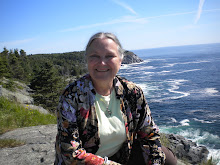I am old. I remember the early '70's when we had that earlier energy crisis. I remember how sensible it seemed to conserve, to wear sweaters in winter and open windows in summer, to walk or ride our bikes, to grow our own food, to insulate things better, to drive cars that burned less fuel, and all the rest. Something happened, and I remember that by the early '80's, it was all buy-buy-buy again, and never stopped. Some of that stuff has stayed with me, but there are many younger people for whom it is just strange. My nephews have fun by driving cars around on logging roads, trying to burn as much gas as they can on each stage of every rally race. They think I'm a little looney. My son seems to have received some of that earlier sensibility, though -- maybe from all those home-made oatmeal cookies of his childhood -- consuming less, growing a garden, and all that. Of course, we all use ski lifts intemperately, and I have a particularly bad habit of getting onto airplanes to zoom over oceans and continents at great expense of greenhouse gases and fossil fuels.
Now, here is the predictably recurring energy crisis again, and here again is a certain wackiness I remember: All the conversation seems focused on corporations and how they can make money in a new and differerent environment. Of course that matters, but it's as true now as it was in the '70's that decentralized solutions have a big contribution to make. The solar panels that just warm up your hot water are still simple and effective, never mind whether they make electricity. Where are they? Smaller houses with better insulation still make sense, and some people are working on making them popular, but do they make the news? No, it's all about cars and power plants.
It's the same as with the so-called War on Drugs. If we just reduce the demand, the problem becomes manageable. Consider these things, I say:
*live in a smaller house or apartment, closer to the place where you work.
*work to make your city a better place to be a pedestrian and user of public transit.
*turn things off, all the way off, and only turn them on when you are really using them.
*find things to do that don't involve driving someplace.
*when you need things, buy them used.
*find things to do that don't involve buying something.
Solar this and that? Get those light bulbs that use so much less energy first. Then see what makes sense for your life about buying more stuff. Something solar might be a good idea.
One thing I'm pretty sure about: They still don't know how to deal with the waste from nuclear power plants. Quite a lot of time has passed since that other time when we all just said "no" to nukes. You would think they might have found a solution, since that's the #1 technical obstacle, right? Did they look? As long as we don't know what we're going to do with the waste, I say, it makes no sense to build new nuclear plants, even if some environmentalists have been persuaded to advocate them in this scary new world of global warming.
Another thing I'm pretty sure about: Coal is bad.
So, beware of "plug-in" electric vehicles. Where will all that power come from? Nukes or coal.
(I'll give my jeremiad on trading energy shortage for food shortages with ethanol another time.)
Feet. Bikes. Buses. Trains. Living closer to where we want to go. Using less. Planting trees and gardens. We could have a good life doing those things. Why not?
